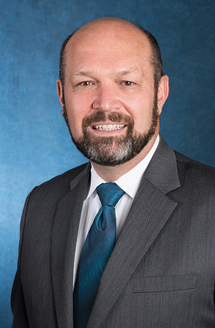
Dr. Friedberg
The scientific plenary at CAP16 provided a riveting look at immunotherapy for lung cancer. “The Immune Checkpoint Revolution in Cancer Treatment: ‘Moonshot’ or ‘Pie in the Sky’?” was moderated by Lynette M. Sholl, MD, an associate pathologist at Brigham and Women’s Hospital in Boston and an assistant professor of pathology at Harvard Medical School. Dr. Sholl, whose translational research and clinical work focus on the molecular mechanisms of tumorigenesis in lung cancer, is one of the pathologists for the second speaker, Barry A. Nelson—a patient who presented in 2012 with stage IIIB lung cancer and a life expectancy of 18 months. Nelson’s oncologist, Christopher S. Lathan, MD, MS, MPH, of the Dana-Farber Cancer Institute and an assistant professor of medicine at Harvard Medical School, rounded out the panel.
Nelson told us he found comfort with his oncologist at the initial appointment, when Dr. Lathan said, “There are lots of tools in our toolbox. We’re going to fight for you just as hard as you’re fighting for yourself.” But the many tools they tried were unsuccessful and some side effects were disabling.
In early 2014, Nelson was accepted for a clinical trial of nivolumab, a second-line immunotherapy treatment that has been found to be effective for some lung cancer patients. He responded quickly to the drug and was soon riding his bicycle to treatments. By February 2016, he was taken off further treatment. Today, this retired executive is a compassionate volunteer and an inspiring advocate for hope.
The scientific plenary was a poignant object lesson in the value of a skilled multidisciplinary team made up of a medical oncologist, a motivated patient, and a deeply knowledgeable pathologist. It was an honor to listen and learn from these three. We saw for ourselves that intensively collaborative approaches hold great promise for pathologists and their patients. Days later, we were still talking about what we had seen, heard, and learned.
CAP16 stood out in several ways. We had 1,360 registered pathologists. Records were set for junior members registered, members registered for CME credit (1,188), and resident-submitted proposals for the poster competition (more than 1,000). The Residents Forum had 23 candidates for seven positions on its board, necessitating a primary election. Also at the Residents Forum meeting, American Board of Pathology CEO Rebecca L. Johnson, MD, and David Gross, PhD, of the CAP Division of Advocacy and Policy in Washington, DC, presented results of research on pathology workforce and hosted a lively Q&A. Even Elvis showed up at the PathPAC reception! Clearly, the years have been kind to him.
CAP16 drew a record number of exhibitors, including several pharmaceutical companies—a demographic that had not joined us before—as major sponsors. Visitors to the CAP booth checked out two new tools: the CAP Learning Dashboard for Maintenance of Certification and the Performance Analytics Dashboard for laboratories. Both should make record-keeping easier.
As is our routine practice, numerous awards presented at the annual meeting send a message about our shared priorities and how we pursue them. Members of the Council on Membership and Professional Development, in conjunction with representatives of all other councils, make the recommendations about who should receive the awards, so it is members recognizing members. I had the privilege of identifying members and staff recipients of the CAP President’s Honors, which signal their value to the CAP and to me. I am routinely amazed at the commitment of our members and staff.
House of Delegates speaker James E. Richard, DO, and his steering committee continue to find new ways to further integrate the House into essential functions of the CAP. The goal is to have our members talking routinely to their delegates about what’s on their minds and to have the delegates share with the Board of Governors what they learn. The House provides advice and counsel to the Board, and a climate of mutual respect will ensure that their suggestions receive full consideration. In this spirit, the officers and members of the House of Delegates had a lively and healthy discussion about the current operations and leadership of the CAP.
This halfway point of my presidency is a good time to remind you that your thoughts and suggestions are always welcome. That’s why my email is at the bottom of this column. As you know, I believe most differences can be resolved by simply having a conversation and recognizing that we can disagree without being disagreeable. That approach worked well in the House panel discussion with the officers, in which we reported on our search for a new CEO. We need to drill down on our vision and evolving needs and determine where we want to be years from now. That’s going to take time and thoughtful conversation, so I hope you’ll be patient. Meanwhile, our longtime CFO, Stephen Myers, has stepped up as interim CEO. We are in good hands.
Traditionally, the pathologist’s role has been more that of consulting expert than medical teammate. We weren’t expected to explain our opinions; we just had to be right. Now, with the increasing importance of science and technology in diagnostics and the decreasing familiarity of many providers with that same science and technology, we need to think about how we communicate and how well we explain what we uniquely understand. As diagnostic and treatment options multiply, we might be navigating toward a new niche that is more deeply embedded in the medical team. Some of us will like that, some will not. Either way, we’re family. We can talk about it.
[hr]
Dr. Friedberg welcomes communication from CAP members. Write to him at president@cap.org.
 CAP TODAY Pathology/Laboratory Medicine/Laboratory Management
CAP TODAY Pathology/Laboratory Medicine/Laboratory Management
